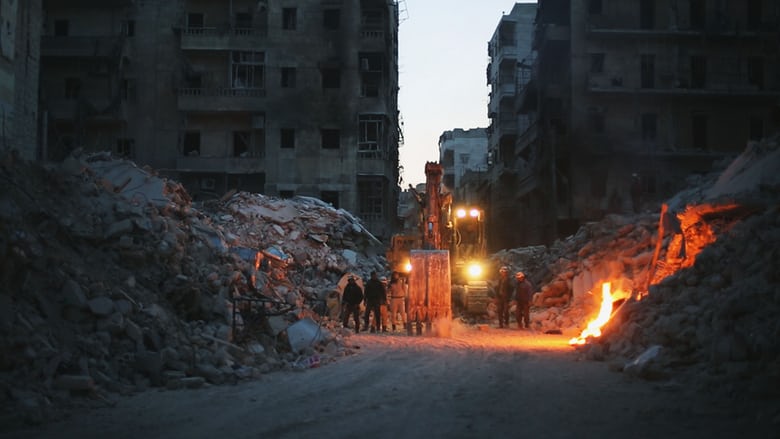The Guardian – The director of the Oscar-nominated documentary Last Men in Aleppo speaks of ‘trauma and paranoia’ over the extreme lengths some are taking to stop him from telling the truth.
On 4 March, the Academy Awards ceremony will be held in Los Angeles. My film, Last Men in Aleppo, is one of the nominees for best documentary feature. It was shot during the 2015-2016 siege of Aleppo, when the Assad regime fought to seize control of the city with the help of its ally, Russia. Throughout this time, the citizens of Aleppo were cut off from food and medical supplies and Russian warplanes dropped bombs on a near-constant basis. That’s the factual background, but the film’s true subject is the people of Aleppo, particularly a small group of volunteer rescue workers with the civil defence Organization known as the White Helmets. Last Men in Aleppo is a diary of war, seen through the eyes of ordinary men who race to bombing sites to save the living and retrieve the dead. It is also a story about hope and belief in human values.
My colleagues and I made Last Men in Aleppo because we believe in the power of film and the arts to bring attention to injustice. The Academy Awards broadcast is one of the world’s biggest public stages, and a tremendous opportunity to connect with audiences outside of movie theaters. I was looking forward to being there alongside two people who are very important to the film: Mahmoud Al Hattar, one of the White Helmets, and my producer, Kareem Abeed.
Now we know that will not happen. About 10 days ago we learned that the Syrian government had denied Mahmoud’s request for a passport. The authorities also scheduled Kareem’s visa interview for two days before the Oscars were to be broadcast. Then, on 20 February, the US government rejected Kareem’s visa application under the rules of Trump’s travel ban, which refuses entry to people from Syria and seven other countries.
Syria’s restrictions on Mahmoud and Kareem’s movements are one way the Assad regime can act to silence witnesses to history. The restrictions are essentially a ban of freedom of expression which is clear for the world to see. But this is not the only action taken to suppress the story of Aleppo. Because the film captures the sickening results of Russian airstrikes, Russia is waging a disinformation campaign to discredit the film, its subjects and me.
The White Helmets had been previously smeared as terrorists when a short film about them, The White Helmets, was released in 2016, so the groundwork was already in place. The propaganda campaign against Last Men in Aleppo started soon after it premiered at the 2017 Sundance film festival and has gotten worse since the Oscar nominations came out in January. The Russian state news agency Sputnik published articles saying Last Men in Aleppo was western-funded propaganda and a recruiting tool for al-Qaida. There have been posts on my Facebook and Twitter pages calling me a terrorist sympathizer and a liar. The Russians hacked the US election. They want to hack the Oscars as well.
There is nothing new about authoritarian regimes using propaganda tactics, psychological warfare and physical threats to silence artists who criticize them or portray them in a way they don’t like. Social media and the tag “fake news” have become very effective and very dangerous weapons in their arsenal. And the attacks aren’t only on social media. I have had some intense, frightening face-to-face encounters.
When I was showing the film at the Palm Springs film festival, a woman accused me of spying for the FBI or CIA and faking news. Another time, I was in Dallas and a Russian man started talking to me. When he realized I was the director of the film, he became hostile and said “I can’t believe your story”. And I told him, “I’m Syrian and I saw the Russian planes dropping bombs. But my film isn’t about the Russians, it’s for the citizens of Aleppo.” And he said, “No, anyone could have staged this.”
It’s even happened with the American authorities. When I was flying from Los Angeles to Turkey to work on my next film, I was stopped by immigration officers. They scrolled through my phone and saw the accusations. They said, “How can we know the people in this film are real?” This is coming from American officials, who are perhaps more prone to scan a person’s phone because of the current political climate. This is the impact of the Russian propaganda.
When I shot this film, I was scared by the war and the bombs, but I had a kind of contract with myself that gave me peace with the idea of death. And I had faced death before. Years ago, I was arrested by the Assad regime and tortured, but even then I didn’t have the same fear that I have now. I knew then what the threats were. I have greater fear now because the threat could come from an unknown person. The Russians call me a terrorist. Trump bans Syrian refugees and says he’s doing it to protect the country. In either case, some ordinary person could decide to do something about the person who is “the enemy”.


